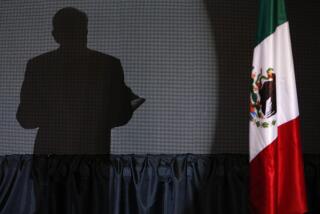Ruling Awaited on Extraditing Ex-Police Chief of Mexico City
A federal magistrate is expected to rule within two weeks on the extradition case against former Mexico City Police Chief Arturo Durazo, a wealthy man who has become a symbol of corruption in Mexican officialdom during the administration of former President Jose Lopez Portillo.
If U.S. Magistrate Volney V. Brown Jr. rules that Durazo is extraditable, it would provide a psychological lift to the administration of current Mexican President Miguel de la Madrid, who has initiated a campaign of “moral renovation” to try to end corruption in government.
Durazo is one of only a very few high-ranking officials in the Lopez Portillo administration to be sought for trial, and his extradition has become a top priority for Mexican authorities.
Durazo, 68, who was appointed to the Mexico City post by Lopez Portillo, a childhood friend, is accused by Mexican authorities of extortion and taking bribes from subordinates, illegal stockpiling of weapons and illegal possession of imported goods during his tenure as police chief between 1978 and 1982.
Mexican investigators say Durazo lived well beyond his means--his police chief’s salary was the equivalent of less than $1,000 a month--accumulating millions of pesos through extortion schemes. His $2.5-million mansion outside Mexico City, equipped with stables, a disco, a dog track and a collection of vintage cars, was confiscated and opened to the public as a “museum of corruption.”
Durazo’s attorneys have opposed extradition on several grounds, insisting, for example, that Durazo might be a target for assassination because he was privy to many secrets held in the highest circles of the Mexican government.
He has been held under 24-hour guard at an undisclosed location in the Los Angeles area since he was arrested at Puerto Rico’s international airport in October, 1984.
His attorneys also argue that there is no evidence directly linking Durazo to the alleged extortion schemes.
The extradition case against Durazo weakened last Thursday when Brown ruled that he would not consider the sworn statements of a key witness, who had implicated Durazo in one massive bribery scheme.
Durazo’s attorneys declined to comment on Brown’s ruling. Prosecutors admitted that the magistrate’s decision not to consider the statements of retired Mexican Army Brig. Gen. Raul Perez Arceo was an “important loss” to their case. “But it’s not fatal,” added Assistant U.S. Atty. J. Stephen Czuleger.
Perez Arceo, who served under Durazo in the late 1970s, had accused the former chief in a sworn statement made in March, 1984, of ordering him to collect millions of pesos from members of the reserve police corps and turn the money over to him.
Allegations Recanted
Prosecutors said Perez Arceo’s assertions were a key part of the allegations of extortion against Durazo.
Last month, however, Perez Arceo recanted his allegations, claiming in a new sworn statement that he signed the old document out of fear that he would be arrested if he did not do so.
His earlier accusations against Durazo, the witness said in the new statement, were “absolutely false.”
When Perez Arceo appeared in court Thursday to back up his new statement, Czuleger objected to any testimony the witness might give. If Perez Arceo were allowed to testify, Czuleger told Brown, prosecutors would be forced to call new witnesses from Mexico to refute the testimony, thus prolonging the extradition proceedings that began in March.
Brown then ruled on the matter, saying, “I will give no weight whatsoever to the (Perez) Arceo testimony.”
After the court session Thursday, Czuleger said there were other witnesses who would stand by their charges of extortion against Durazo.
‘Clear Evidence’
In his final argument, Czuleger said the enormous wealth accumulated by Durazo during his tenure as Mexico City police chief stands as “clear evidence” of his corruption.
(Mexican authorities seeking Durazo’s extradition have estimated his wealth to be around $200 million, including expensive homes in Canada, the United States and Mexico.)
“Durazo raped and pillaged his country for six years,” Czuleger charged. “He lived very well by his schemes.”
Bernard Zimmerman, a San Francisco attorney representing Durazo, denied any wrongdoing on his client’s part.
“It’s interesting that some of the people (accused of being part of Durazo’s alleged scheme) are still on the (Mexico City) police force,” Zimmerman said.
The U.S. State Department has the final say on extradition cases, and it historically has extradited those who have been ruled extraditable unless there are compelling diplomatic or political reasons not to do so.
More to Read
Sign up for Essential California
The most important California stories and recommendations in your inbox every morning.
You may occasionally receive promotional content from the Los Angeles Times.










